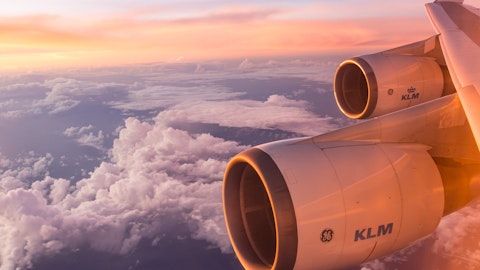Ted Christie: So I’ll do my best to summarize I don’t have the specific data at hand. But when we purchased this engine and went through the RFP process to determine what the power plant was going to be on the neo. We made assumptions about time on wing between major shop visits and reliability, generally speaking, for unscheduled removals that were consistent assumptions with what we’ve experienced with our CO power. So with the V2500, what has been experienced with the other engine manufacturers kind of legacy power, that sort of thing. It’s fair to say that the teething issues have gone longer and deeper than any operator anticipated. I think that’s fair for the two manufacturers as well. So rather than it being 6 or 7 or 8 years between removals and shop visits, we’re seeing a considerable higher uptick in frequency.
Just last year, I believe we removed 30-plus engines. And we’ve been operating this aircraft for about 6 years, of which the vast majority of them have delivered over the last two. So we’re still working through it. And obviously, there is warranty on the engines that’s part of our purchase agreement and that is €“ we’re satisfied with the cover there. And in constant discussions with proud on the best way to kind of like mitigate these problems and come up with a better solution. And they have been a willing partner. It’s just €“ I know it’s frustrating for both of us that we’re still here right now.
Duane Pfennigwerth: So it sounds more like an aircraft availability issue than a cost issue?
Ted Christie: That’s right. Right now, it is largely that. I mentioned that in a 2-week period, what happened to us right now, we just €“ we didn’t anticipate having that many aircraft without engines available, either spare engines or returns from the shop. And so we had to take utilization down as a result because those are impactful to fleet utilization.
Duane Pfennigwerth: Got it. Got it. And then just on the Airbus delivery delays, can you speak to any penalties or credits related to that?
Scott Haralson: Hey, Duane, this is Scott. So no, there are no penalties at this point. These are sort of excused delays with the supply chain issues that are happening around the world. Airbus is not immune. So at this point, no financial components associated.
Duane Pfennigwerth: Okay. Thank you. Look forward to speaking more soon.
Ted Christie: Thanks.
Operator: And we will take our next question from Dan McKenzie with Seaport Global. Your line is open.
Dan McKenzie: Hey, good morning, guys. Thanks. Going back to the script and the headwinds to normalized margins and the more conservative approach to schedules this year. With respect to the downward pressure on revenue that you referenced, how much downward pressure is reversed as you get back to normalized network planning and utilization? And I guess what’s the best way for investors to get comfortable with continued revenue execution?
Matt Klein: Hey, Dan, it’s Matt. I’ll take that. There is a couple of components that flow into that. One is, we continue to have on purpose. We’re still a little smaller fly into Florida than we would otherwise be. And then another thing, and this is the same trend that we saw in our schedule last quarter as well, which is just flying more off-peak days of week as well. And the reason why we’re doing that is largely to make sure we can maintain a reliable operation at our airports and for all of our crew and team members out there. So those two components combined add up to about 1.5 points in the first quarter is our expectation that we’re taking when we talk about unit revenue penalty. So last quarter, it was more than that.





